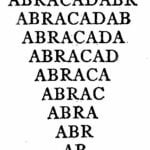Abracadabra
Contents
(Top)
Abracadabra is a magic word used as an incantation in rituals, on amulets, and common today in stage magic.
Origin
The exact origin of abracadabra is unknown, but according to the Oxford English Dictionary, its first known occurrence is in the second-century works of Serenus Sammonicus, a Roman physician and writer.
Several folk origins are associated with the word: from phrases in Hebrew that mean “I will create as I speak”, or Aramaic “I create like the word” (אברא כדברא), to etymologies that point to similar words in Latin and Greek such as abraxas or to its similarity to the first four letters of the Greek alphabet (alpha-beta-gamma-delta or ΑΒΓΔ).
History
The first known mention of the word was in the second century AD in a book called Liber Medicinalis (sometimes known as De Medicina Praecepta Saluberrima) by Serenus Sammonicus, physician to the Roman emperor Caracalla, who in chapter 52 prescribed that malaria sufferers wear an amulet containing the word written in the form of a triangle.
The power of the amulet, he claimed, makes lethal diseases go away. He believed that as the word diminished in size, so would the disease. Other Roman emperors, including Geta and Severus Alexander, were followers of the medical teachings of Serenus Sammonicus and may have used the incantation as well.
It was used as a magical formula by the Gnostics of the sect of Basilides in invoking the aid of beneficent spirits against disease and misfortune. It is found on Abraxas stones, which were worn as amulets. Subsequently, its use spread beyond the Gnostics.
Abracadabra is now more commonly used as a magic word in the performance of stage magic.
Occult Usage
Abracadabra was widely used as an incantation on amulets and charms throughout the Middle Ages and Renaissance. It was believed to have various magical powers, such as protection from evil spirits, healing of diseases, invisibility and transformation. Some examples of abracadabra charms are:
- A ring with abracadabra engraved on it was worn by Alexander Severus, a Roman emperor who reigned from 222 to 235 AD.
- A poem by Quintus Serenus Sammonicus instructed people to write abracadabra on parchment and wear it around their necks for nine days to ward off fever.
- A manuscript from 13th-century England advised people to write abracadabra on an apple and give it to someone they love to make them fall in love with them.
The religion of Thelema spells the word ‘Abrahadabra’, and considers it the magical formula of the current Aeon. The religion’s founder, Aleister Crowley, explains in his essay Gematria that he discovered the word (and his spelling) by qabalistic methods. The word ‘Abrahadabra’ also appears repeatedly in the 1904 invocation of Horus that led to the founding of Thelema. (The Equinox I, no. 7. 1912)
See Also
- Magickal Formula
- Barbarous Name
- Sator Square

